Profile
Donald Gwira: Martial arts legend, corporate communications giant

Mr. Donald Gwira might not need much introduction in corporate circles. He is an astute professional with solid background in Corporate Communication, Development, Advocacy and Project Management.
But this is not all that he is made of. He is a force to reckon with and cannot be underestimated in the art of self-defence as he holds fifth degree black belt in African Goju.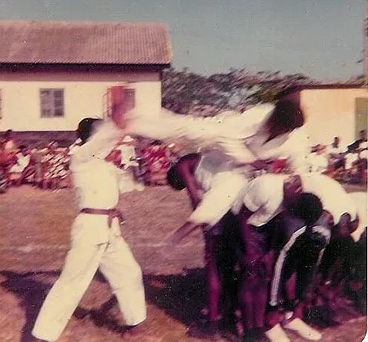
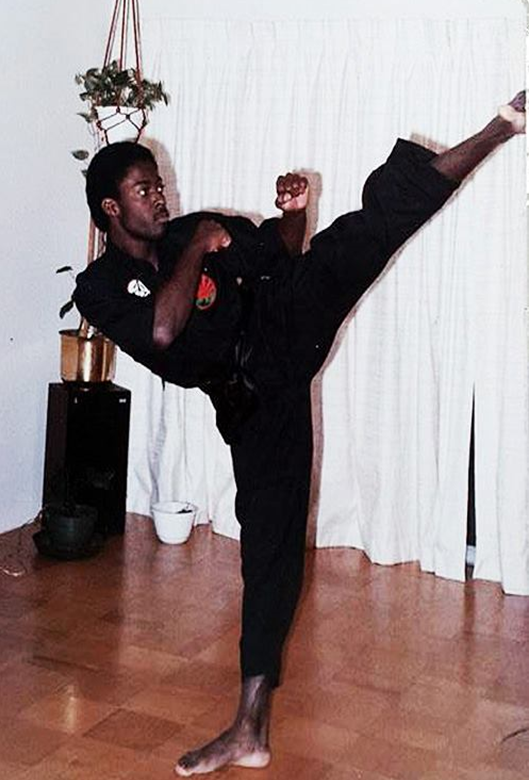

The Spectator recently interacted with the legend who has earned the title “Great Warrior” for his exceptional tactics and contribution to the sport in Ghana and abroad.
Exposure
Highlighting his progression through various forms of martial art, Mr. Gwira acknowledged the influence of his three siblings who were all well-versed in the sport.
According to him, the interest grew at age 12 following his exposure to Kunfu movies and had to study under his elder brother, Danny Gwira, in the early 70s at Adisadel College.
“When my brother left, I took over and started teaching [martial arts] in form two at Adisadel College. We organised martial art competitions, did a lot of demonstrations and started spreading martial arts in schools in Cape Coast,” he recalled.
After secondary school, he continued his education at American College in France (now American University of Paris) where he started a martial art institute before proceeding to Howard University in the United States of America (USA) for his Master’s Degree.
At Howard University, he again formed clubs and continued teaching and sharpening his skills until he returned to Ghana.
“I started with Taekwondo, moved on to Shotokan (Japanese form of martial art), and then to Chinese Goju and later migrated to African Goju, which was started by my brother,” he noted.
In 1979, young Donald obtained his first degree black belt and kept training until he secured his fifth degree black belt in 1995. He stopped teaching martial art in 1998 but continued to maintain regular exercise and fitness regime at home to enhance his health and physique.
“The more I trained, the better I became. At my age, I still keep fit; I do a lot of walks every day and I sometimes do sit ups and push ups at home or at the gym to stay active,” he said.
Achievement
The flying kick specialist set an unbeaten record in 1979 after jumping over 12 people to break a two-inch-thick tile at the Burma Camp when the Martial Art Institute did a demonstration for the Ghana Army.
That same year, he was crowned ‘Martial Artist of the Year’ and went ahead to be adjudged the ‘Best Kata’ and ‘Best Breaking’ in 1980 and 1981 respectively. ‘Kata’, he explained, “are a series of leg and hand movements that help one defend him or herself from more than one attacker.”
In 2010, he was named Life Patron and inducted into the Hall of Fame of the Martial Arts Institute for his ‘’outstanding and appreciable’’ contribution to African Goju in France, the USA and Ghana.
He and his three brothers, on separate occasions, were responsible for training the personal body guards of former Head of State, General Kutu Acheampong.
With over 40 years experience in the art, Mr. Gwira continues to attend karate and martial arts tournaments organised locally and looks forward to training more young people to accomplish more than he has achieved.
Corporate Experience
The fighter holds a Bachelor’s Degree in International Affairs from American University in Paris, and a Master’s in Political Science from Howard University, USA.
Currently an Independent Communications Consultant, he worked at Airtel Ghana, Guinness Ghana Breweries, International Agency for the Prevention of Blindness (IABP), among other organisations and served also on boards of some public institutions, including New Times Corporation, publishers of Ghanaian Times and The Spectator.
In 2017, he was named one of the ‘Most Impactful Corporate Social Responsibility (CSR) Leader’ while at Afriwave Telecom as Corporate Affairs Director.
He said the philosophies of martial art which became useful in aspects of his career, could be applied to personal and business endeavours, stressing that discipline, timeliness and preparation should guide young people in the corporate world.
“In martial art, you have to get your timing right; if you miss a split second, you get hit. When you transfer this into real life, it helps you to be more productive,” he said.
The powerhouse of martial arts, therefore, advocates that Martial Arts should be taught in basic schools while efforts be made to develop other forms of sport, apart from football.
Other Engagements
Mr. Gwira, from Elmina in the Central Region, is married to Mrs. Frances Gwira with four children. He is a member of the Agape Church at East Legon, Accra.
All his children, he said, had taken up one form of sport or the other with the youngest, a promising swimmer, aiming to win Gold for the Black Dolphins at future Olympics.
Admitting the rewards of martial art, he noted that those willing to take up the art should be ready to train everyday adding that progress depended on how fast one was able to learn the techniques.
Asked how long one must study martial art, he said: “There is no stopping; the only ingredient is to keep practising everyday.”
All things being equal, the 61-year-old would want to attain a Ninth Degree Black Belt in Martial Art.
By Ernest Nutsugah
Profile
Edwina Anokye-Bempah Redefining Trust in Ghana’s Real Estate Landscape

Every morning begins the same way for Edwina Anokye-Bempah, with quiet devotion. It is her grounding ritual, a moment of reflection and gratitude before she steps into the dynamic, often unpredictable world of real estate brokerage.
By the time she arrives at the office, she has already set the tone for her day. She reviews the previous day’s tasks, checks what was accomplished and what still needs attention, and then drafts a new to-do list. For her, success is rooted in deliberate planning, discipline, and the commitment to follow through.
Today, Edwina stands out as one of Ghana’s promising real estate brokers, but she is also clear about the distinctions within her field. While many people casually use the term ‘realtor,’ she is quick to explain that only professionals registered with the National Association of Realtors can claim that title.
“Since I am not registered with the association, I am a real estate broker,” she says. It is a role she embraces wholeheartedly, facilitating transactions, connecting buyers and sellers, and ensuring clarity and integrity at every step.
Her journey into the industry took shape at MeQasa, an online platform dedicated solely to real estate. The platform exposed her to developers, agents, and the complexities of property transactions. She worked closely with developers and observed one recurring problem: clients often complained about agents who failed to respond, follow up, or provide accurate information.
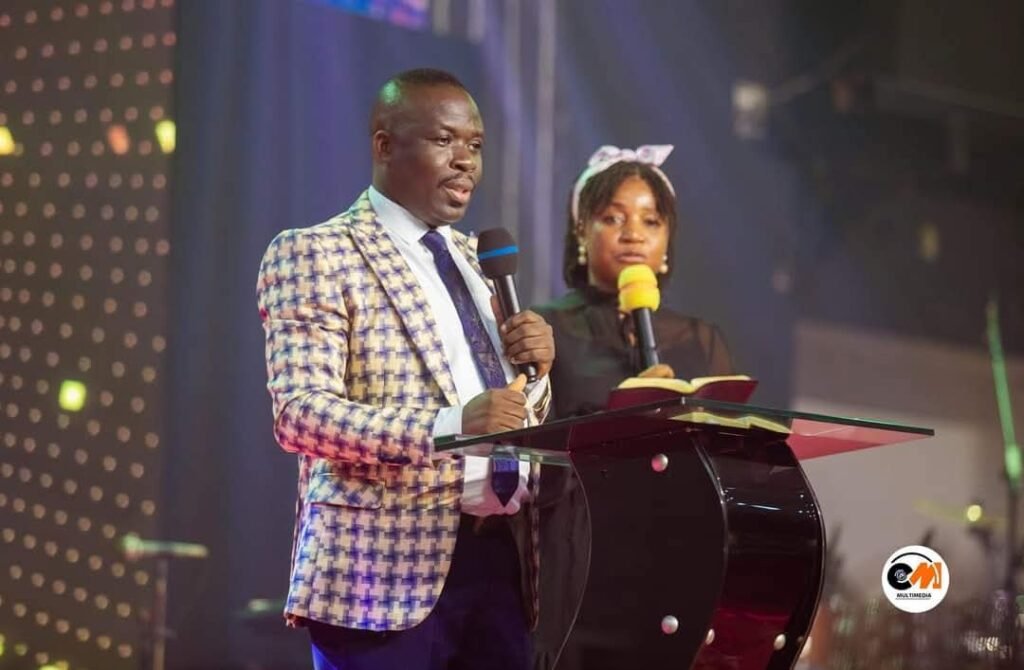
With her background in sales and marketing, Edwina felt naturally drawn to the field. It was an industry where she believed she could make a meaningful, positive impact. Real estate, she came to learn, is far more than brick and mortar. It is about helping people secure one of the most important investments of their lives. This understanding shapes every decision she makes.
One of the most challenging tasks in her work is qualifying clients.
“A serious buyer must be willing, ready and able,” she explains. When one of these three qualities is missing, the transaction is likely to stall or collapse entirely.
On the seller’s side, due diligence is equally critical. Ownership disputes, land fraud, and unclear documentation remain some of the biggest risks in Ghana’s real estate sector.
Edwina understands the weight of the responsibility she carries. “The money involved is huge. These are people’s lifetime savings. Most people buy one home or maybe two in their entire lives. You cannot afford to make a mistake.”
Working in what many describe as a male-dominated field has never intimidated her. With an MBA in Marketing and extensive experience in sales roles including a stint as an Account Manager in an advertising agency, she has grown comfortable handling clients, negotiating deals, and presenting herself with confidence.
“My gender has never discouraged me,” she says. “What matters is hard work and ensuring that the client’s needs were met.”

The only occasional challenge, she admits, was maintaining professional boundaries when some men attempt to be overly familiar. Her solution is simple: stay professional and do not over-familiarise yourself with clients.
Her educational journey started in Kumasi, followed by Yaa Asantewaa Girls’ Senior High School, where she studied Agricultural Science. She continued the same at the University of Ghana before pursuing her master’s degree. After university, she worked on her uncle’s poultry farm before moving into advertising. Later, her role at MeQasa finally opened the door to the career she had long been unknowingly preparing for.
Over the years, Edwina has built a reputation not only for competence but also for care. She recalls one client in particular, an older man relocating to Ghana with no family in the country. After helping him secure two homes, she became the closest person he could rely on. One evening at around 8 p.m., he called to say he felt unwell. Without hesitation, she drove to his home and rushed him to the hospital. Doctors later told her that any delay could have been fatal.
For Edwina, that moment affirmed that the job goes far beyond selling property. “It doesn’t end with the sale,” she says. “You have to look out for people.”
Her influence also extends to younger people observing her journey. She is known for her tenacity, her refusal to give up on clients or tasks, and her resilience in the face of challenges. Those who work around her learn to push forward regardless of setbacks.
“If a deal doesn’t go as expected, you don’t look back. You find a way.”
Beyond real estate, Edwina serves as an interpreter in her church, a role that dramatically boosted her confidence. What began with trembling legs has evolved into a boldness that reflects in her public speaking and client interactions. She credits her growth to God, her senior pastor, her mother, siblings, friends, and her dedicated team — “an amazing circle,” she calls them.
Today, she is also a partner in a showroom business dealing in vanity units, sanitary wares, and tiles, an extension of her real estate insight and experience.
For young people aspiring to join the industry, her advice is clear: “Learn the industry beyond selling. Understand transactions, build strong relationships, and always do your due diligence.”
For Edwina Anokye-Bempah, real estate is more than business; it is trust, service, and impact, one client at a time.
By Esinam Jemima Kuatsinu
Join our WhatsApp Channel now!
https://whatsapp.com/channel/0029VbBElzjInlqHhl1aTU27
Profile
How a Collapsed Dream Birthed Another: Daniel Debrah’s Music Journey

From the age of five, Daniel Nana Kwesi Kakra Debrah has lived a life surrounded by rhythm, harmony, and the quiet pulse of music. Growing up in a home where instruments filled corners and rehearsals were as normal as conversation, Daniel’s first teachers were not in formal classrooms—they were the sounds, movements, and discipline he absorbed from his father, a committed church musician.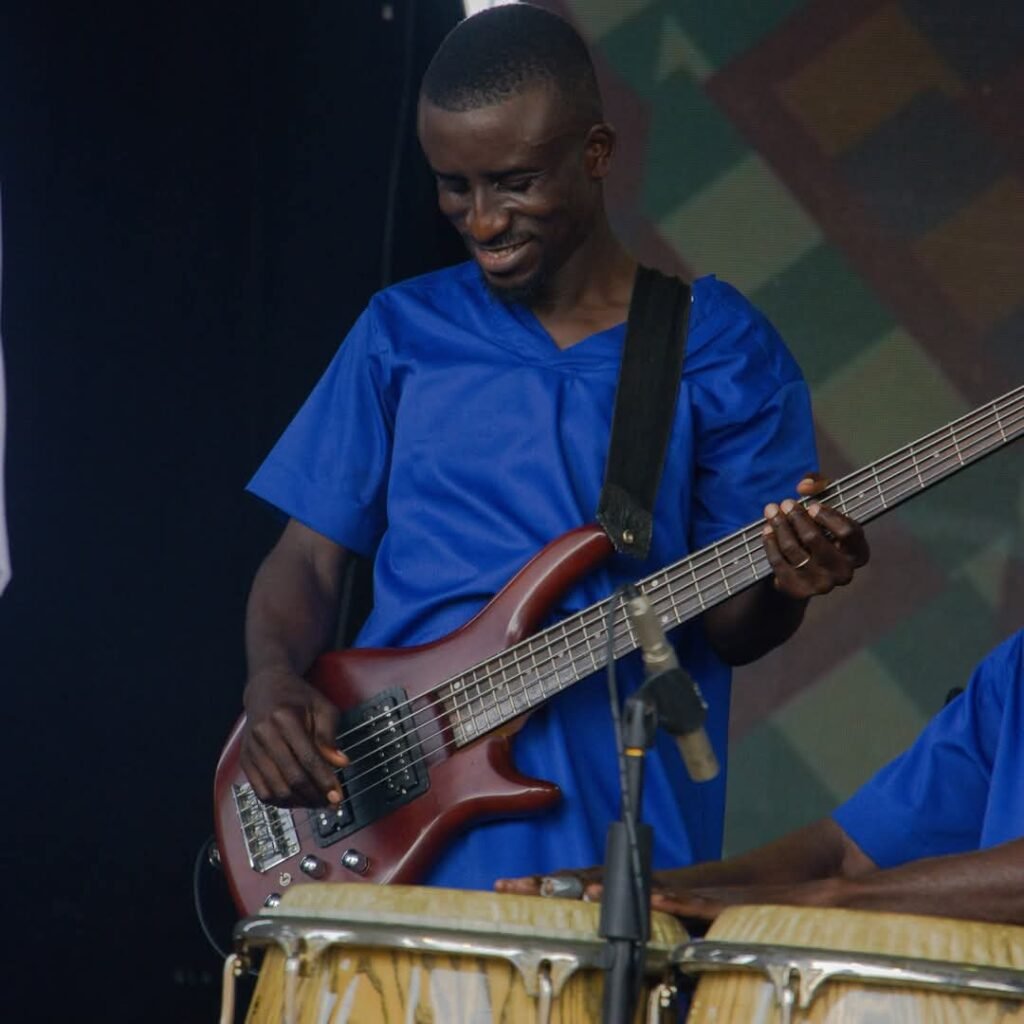
Ironically, music was not Daniel’s first dream. Like many young boys, he once hoped to become a professional footballer. But an injury from a school match left him unable to walk for three months, forcing him to retire that ambition. What seemed like a tragedy at the time became the turning point that aligned him with the path he was always meant to follow.
Daniel’s earliest musical expression began in church. As a boy in Sunday School, he eagerly ‘pounded’ the drums, quickly becoming known as the child who never missed an opportunity to play. Even in Senior High School (SHS), although many of his classmates were unaware of his talent, he continued practising quietly until completing school in 2005.
After SHS, Daniel joined a church music class with the intention of growing as a drummer, but one moment changed everything. Watching a bass guitarist perform stirred something in him. Drawn to the deep, steady tones of the bass, he persuaded a friend to teach him the basics. With no instrument of his own, Daniel practised at home using a broken guitar for more than eight months.
Then destiny intervened. The church’s lead bassist was suddenly suspended, and Daniel stepped in voluntarily during an evening service. That temporary voluntary act became permanent as he was asked by the then Music Director to fill in the gap. From that point, he embraced the bass guitar fully—a decision that defined the rest of his life.
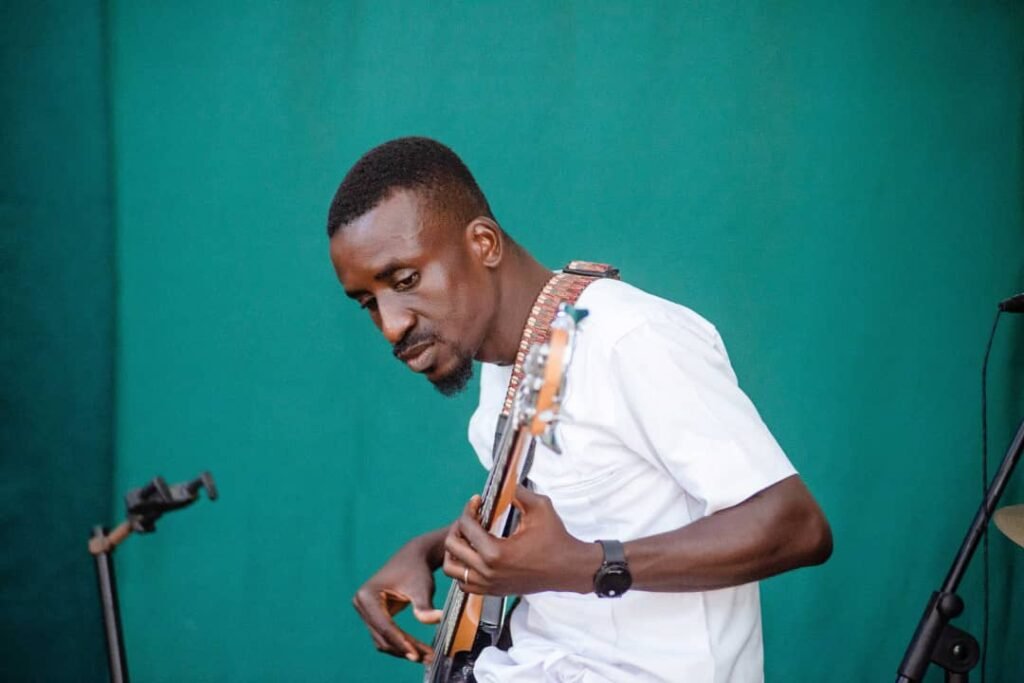
Around 2006, Daniel made a life-changing decision to take his craft seriously. He began practising for hours on end, sometimes up to eight hours a day, often without food, locked away from family and friends, perfecting techniques and expanding his creativity. While others assumed he was outdoors socialising, Daniel was indoors sharpening his gift.
His breakthrough came in 2007 when he performed in the TV3 Bands Alive competition. The exposure, applause, and feedback confirmed his dream: “music was not just a passion; it was his calling,” he said.
With time, Daniel moved confidently into the professional space. He performed at studio sessions, live concerts, weddings, church events, and high-profile national programmes. His talent, discipline, and reliability earned him a reputation that continues to attract respected gospel artistes.
Today, he works closely with Daughters of Glorious Jesus, Chris Apau, and Israel Ofori, who have been of immense help to his career ministry. He also collaborates with several ministries and offers support with musical arrangements, live performances, and studio recordings.
Beyond the stage, Daniel sees himself as a mentor. Many young musicians reach out to him, some visiting in person, others calling for guidance. Whether through hands-on training or virtual coaching, he is always ready to teach. For Daniel, music is not just technique; it is character, discipline, and values. He believes a musician must carry integrity both on and off stage.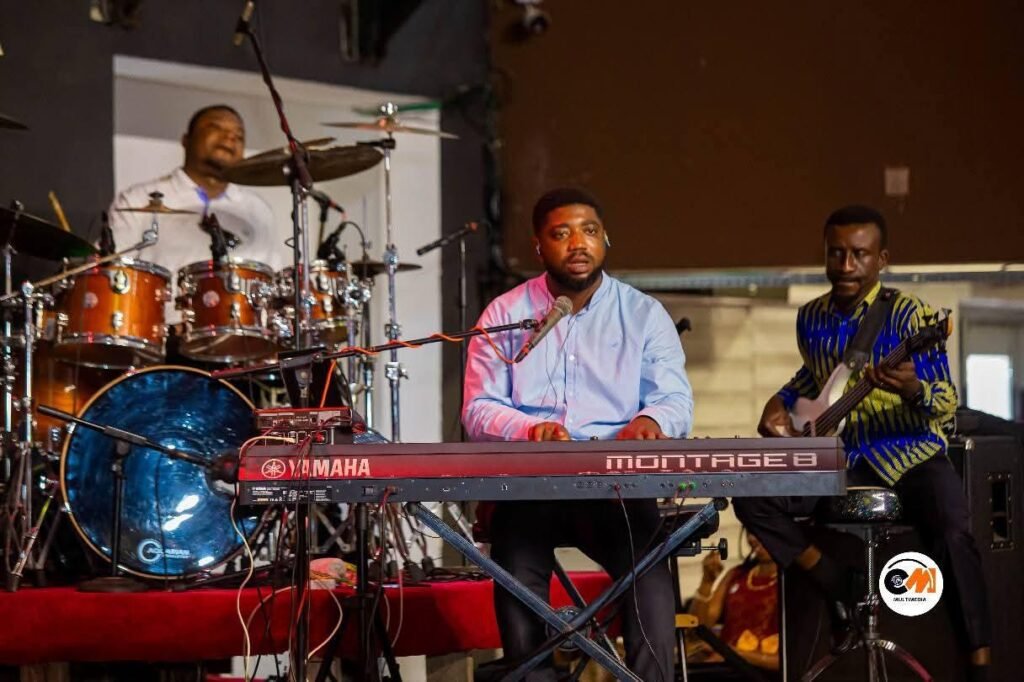
Like many musicians in Ghana, Daniel has faced challenges with delayed payments and broken agreements. These experiences have taught him to value professionalism. He now insists on part payment upfront and charges more for his services, a decision grounded in self-respect and fairness.
Daniel’s journey in music has been shaped by various individuals who have supported him at different stages of his career. He acknowledged Opoku Agyeman Sanaa, Kofi Ennin, Andrew Klu, Mr. Samuel Abbey, Mr. Samuel Sarpong Agyei, Paul Quartey, Mr. Nene Emmanuel, and Mr. Isaac Asiedu, saying that their belief in him continues to inspire his journey.
Daniel’s work is guided by his Christian faith. He sees music as ministry, not merely entertainment. Off stage, he is a devoted family man—a husband and father of two, a boy and a girl, who have also started playing musical instruments. During his leisure time, he listens to music, or plays football and action video games.
Through his acts of service and unwavering determination, Daniel continues to inspire others, proving that when passion meets integrity, ordinary men impact the lives of others.
By Esinam Jemima Kuatsinu







